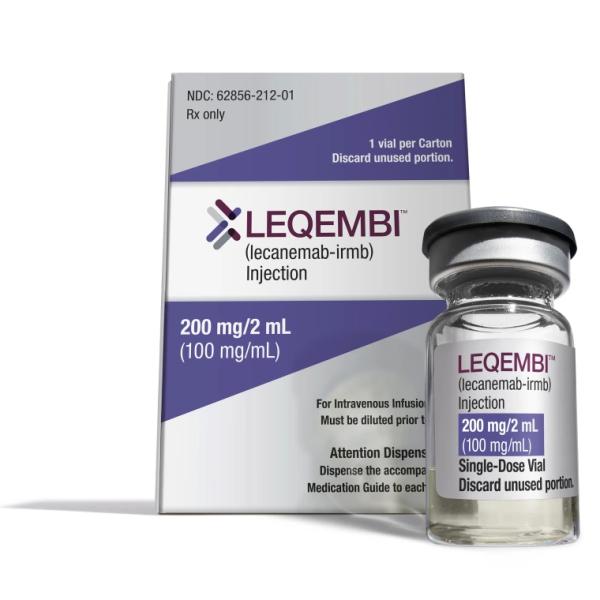Lecanemab Side Effects
Medically reviewed by Drugs.com. Last updated on Feb 16, 2025.
Applies to lecanemab: intravenous solution.
Important warnings
This medicine can cause some serious health issues
Intravenous route (solution)
Warning: Amyloid Related Imaging Abnormalities. Monoclonal antibodies directed against aggregated forms of beta amyloid, including lecanemab-irmb, can cause amyloid related imaging abnormalities (ARIA), characterized as ARIA with edema (ARIA-E) and ARIA with hemosiderin deposition (ARIA-H).
Incidence and timing of ARIA vary among treatments.
ARIA usually occurs early in treatment and is usually asymptomatic, although serious and life-threatening events rarely can occur.
Serious intracerebral hemorrhages, some of which have been fatal, have been observed in patients treated with class of medications.ApoE e4 Homozygotes. Patients who are apolipoprotein E e4 (ApoE e4) homozygotes (approximately 15% of Alzheimer's disease patients) treated with this class of medications, including lecanemab-irmb, have a higher incidence of ARIA, including symptomatic, serious, and severe radiographic ARIA, compared to heterozygotes and noncarriers.
Testing for ApoE e4 status should be performed prior to initiation of treatment to inform the risk of developing ARIA.
Prior to testing, prescribers should discuss with patients the risk ARIA across genotypes and the implications of genetic testing results.
Prescribers should inform patients that if genotype testing is not performed they can still be treated with lecanemab-irmb; however, it cannot be determined if they are ApoE e4 homozygotes and at higher risk for ARIA.Consider the benefit of lecanemab-irmb for the treatment of Alzheimer's disease and potential risk of serious adverse events associated with ARIA when deciding to initiate treatment with lecanemab-irmb.
Precautions
It is very important that your doctor check your progress at regular visits to make sure this medicine is working properly. Blood tests may be needed to check for unwanted effects.
This medicine may cause amyloid related imaging abnormalities (ARIA), which can be seen as temporary swelling or bleeding in the brain. Call your doctor right away if you have changes in vision, confusion, dizziness, headache, nausea, or seizures.
This medicine may cause infusion-related reactions, which can be life-threatening and require immediate medical attention. Check with your doctor right away if you have back pain, blurred vision, chest tightness, chills, confusion, cough, dizziness, dizziness, faintness, or lightheadedness when getting up suddenly from a lying or sitting position, drowsiness, fever, flushing, general feeling of discomfort or illness, headache, joint pain, muscle aches and pains, nausea and vomiting, nervousness, pale skin, pounding in the ears, runny nose, shivering, slow or fast heartbeat, sore throat, sweating, trouble breathing, trouble sleeping, or unusual tiredness or weakness.
This medicine may cause serious allergic reactions, including anaphylaxis and angioedema, which can be life-threatening and require immediate medical attention. Check with your doctor right away if you have a cough, difficulty swallowing, dizziness, fast heartbeat, large, hive-like swelling on the face, eyelids, lips, tongue, throat, hands, legs, feet, sex organs, rash, itching, trouble breathing, or unusual tiredness or weakness after receiving this medicine.
Do not take other medicines unless they have been discussed with your doctor. This includes prescription or nonprescription (over-the-counter [OTC]) medicines and herbal or vitamin supplements.
See also:
Serious side effects of lecanemab
Along with its needed effects, lecanemab may cause some unwanted effects. Although not all of these side effects may occur, if they do occur they may need medical attention.
Check with your doctor or nurse immediately if any of the following side effects occur while taking lecanemab:
More common side effects
- back pain
- blurred or changes in vision
- chest tightness
- chills
- confusion
- diarrhea
- dizziness
- dizziness, faintness, or lightheadedness when getting up suddenly from a lying or sitting position
- drowsiness
- feeling shaky
- fever
- flushing
- general feeling of discomfort or illness
- headache
- joint pain
- loss of appetite
- muscle aches and pain
- nausea and vomiting
- nervousness
- pale skin
- pounding in the ears
- runny nose
- seizures
- shivering
- slow or fast heartbeat
- sore throat
- sweating
- trouble breathing
- trouble sleeping
- unusual tiredness or weakness
Less common side effects
- cough or hoarseness
- lower back or side pain
- painful or difficult urination
Incidence not known
- cough
- difficulty swallowing
- dizziness
- fast heartbeat
- hives, itching, skin rash
- large, hive-like swelling on face, eyelids, lips, tongue, throat, hands, legs, feet, sex organs
- puffiness or swelling of the eyelids or around the eyes, face, lips, or tongue
For healthcare professionals
Applies to lecanemab: intravenous solution.
General adverse events
The most common adverse reactions reported were infusion-related reactions, headache, and amyloid related imaging abnormalities.[Ref]
Cardiovascular
- Common (1% to 10%): Atrial fibrillation[Ref]
Gastrointestinal
- Common (1% to 10%): Diarrhea[Ref]
Hematologic
- Common (1% to 10%): Lymphopenia[Ref]
Other
- Very common (10% or more): Infusion-related reactions (20%)[Ref]
Respiratory
- Common (1% to 10%): Cough[Ref]
Nervous system
- Very common (10% or more): Amyloid related imaging abnormalities (10%), headache (14%)[Ref]
References
1. (2023) "Product Information. Leqembi (lecanemab)." Eisai Inc, 1
Frequently asked questions
- What drugs can help improve or slow down memory loss?
- What's the mechanism of action for Leqembi (lecanemab-irmb)?
More about lecanemab
- Check interactions
- Compare alternatives
- Reviews (3)
- Dosage information
- During pregnancy
- Drug class: miscellaneous central nervous system agents
- En español
Patient resources
Other brands
Professional resources
Other brands
Related treatment guides
Further information
Lecanemab side effects can vary depending on the individual. Always consult your healthcare provider to ensure the information displayed on this page applies to your personal circumstances.
Note: Medication side effects may be underreported. If you are experiencing side effects that are not listed, submit a report to the FDA by following this guide.

